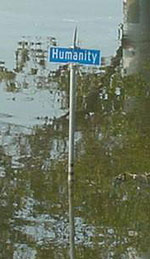August 29:
President George Walker Bush: “For those of you who are concerned about whether or not we’re prepared to help, don’t be. We are. We’re in place. We’ve got equipment in place, supplies in place. And once the — once we’re able to assess the damage, we’ll be able to move in and help those good folks in the affected areas.”
September 1 (from ABC’s “Nightline”):
Ted Koppel: “Mr. Brown, some of these people are dead. They’re beyond your help. Some of these people that have died because they needed insulin and they couldn’t get it. Some of the people died because they were in hospitals and they couldn’t get the assistance that they needed. You say you were surprised by the fact that so many people didn’t make it out. It’s no surprise to anyone that you had at least 100,000 people in the City of New Orleans where are dirt poor. Who don’t have cars, who don’t have access to public transportation, who don’t have any way of getting out of the city simply because somebody says, ‘you know, there’s a force five storm coming, you ought to get out.’ If you didn’t have buses there to get them out, why should it be a surprise to you that they stayed?
Michael Brown: Well, Ted, you know, we’re, I’m not going to sit here and second guess –why or when evacuation orders were given or why or why not the city didn’t have buses available. You know, that’s just not the thing that we need to do right now. Frankly, if they, if they had, if they had put buses there. …
Koppel: I’ve heard you say during course of this evening on a number of interviews you just found out about it today. Don’t you guys watch television? Don’t you guys listen to the radio? Our reporters have been reporting about it for more than just today.
Brown: We learned about it factually today that that what existed. We’ve been so focused on doing rescue and life-saving missions and evacuating people from the Superdome that when we first learned about it, of course, my first gut instinction, instinct was, get somebody in there, get me truth on the ground, let me know, because if it’s true we’ve got to help those people.
September 3:
Bush: “Brownie, you’re doing a heck of a job.”
September 9:
Although Brown was not allowed to answer [questions about why he was being relieved of disaster-response duties in Louisiana, he later told an Associated Press reporter in an interview that it was not his idea to go back to Washington. Asked if he was being made a scapegoat, he said: “By the press, yes. By the president, no.”
September 12:
Brown: “I think it’s in the best interest of the agency and the best interest of the president to do that and get the media focused on the good things that are going on, instead of me.”
New York Times:
45 Bodies Found in a New Orleans Hospital
By Kirk Johnson
NEW ORLEANS, Sept. 12 – The bodies of 45 people have been found in a flooded uptown hospital here, officials said Monday, sharply increasing the death toll from Hurricane Katrina and raising new questions about the breakdown of the evacuation system as the disaster unfolded.
Officials at the hospital, the Memorial Medical Center, said at least some of the victims died while waiting to be removed in the four days after the hurricane struck, with the electricity out and temperatures exceeding 100 degrees.
Technorati Tags: hurricane katrina, katrina

